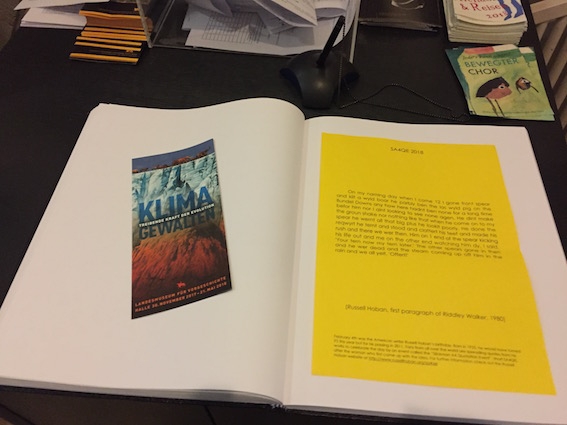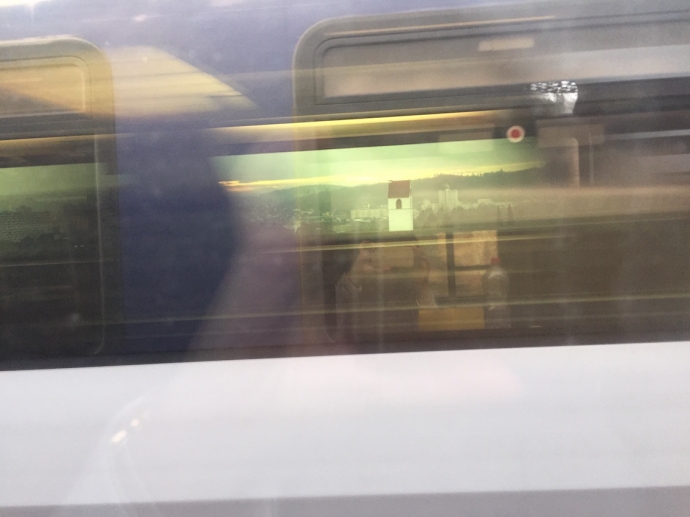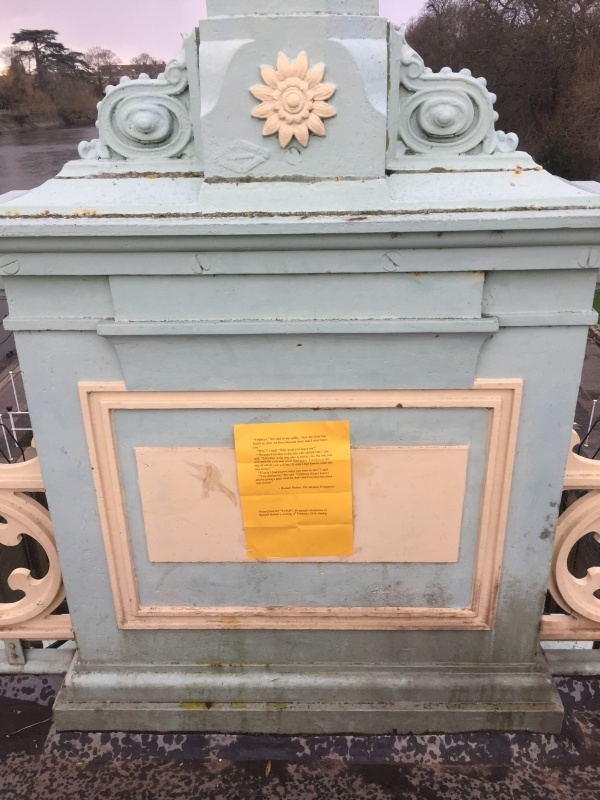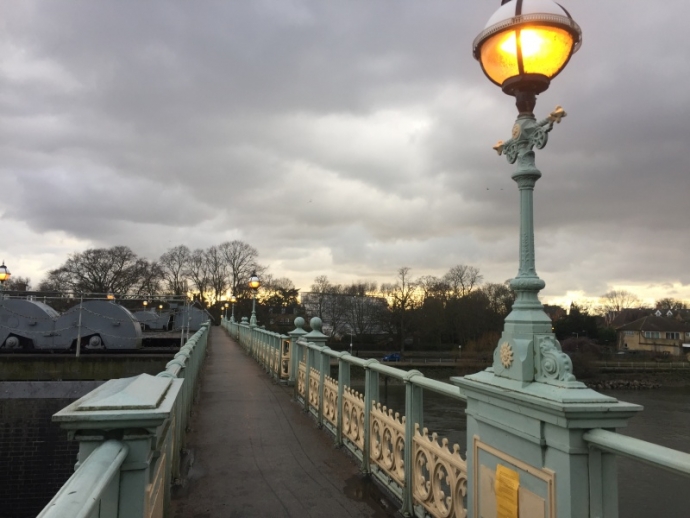SA4QE - The Slickman A4 Quotation Event 2018
SA4QE 2018 - Roland Clare - Bristol, United Kingdom
SA4QE 2022 - Yvonne Studer - Zürich, Switzerland
This weekend I took part in a geography excursion to Halle an der Saale and Magdeburg in Germany from Friday night the 2nd until Sunday morning the 4th of February, Russ's birthday. A colleague of mine had arranged the adventure and had invited me to accompany him and a group of 14-year-old students we both teach. That in itself was cool, but in addition, it was also a wonderful opportunity to boldly place quotations from Russell Hoban's works in a location the yellow paper had never been to before. Having very little time to select quotations for SA4QE I restricted myself to two, one from Riddley Walker, the other from The Medusa Frequency.
Our first destination on Saturday morning was the fabulous "Landesmuseum für Vorgeschichte" in Halle an der Saale (http://www.lda-lsa.de/landesmuseum_fuer_vorgeschichte/). I thought a passage from Riddley Walker would certainly be suitable for a museum specializing in prehistory. Little did I know just how perfectly the opening lines of the novel would resonate with the things we learned at the exhibition, whose theme was climate change and its impact on evolution (Klimagewalten: Treibende Kraft der Evolution).
At first, our guide, Matthias Vogt, showed us a model of a huge ancient hyena, a scary animal that appeared to have loved hunting humanoids - three pierced skulls found in a cave documented which parts of its prey the beast had obviously enjoyed the most - their brains. But when human beings began to develop and finally managed to make spears, it became possible for them to reverse the roles of hunter and hunted. When I saw one of the spears found in Schöningen, Riddley began to talk to me:
On my naming day when I come 12 I gone front spear and kilt a wyld boar he parbly ben the las wyld pig on the Bundel Downs any how there hadnt ben none for a long time befor him nor I aint looking to see none agen. He dint make the groun shake nor nothing like that when he come on to my spear he wernt all that big plus he lookit poorly. He done the reqwyrt he ternt and stood and clattert his teef and made his rush and there we wer then. Him on 1 end of the spear kicking his life out and me on the other end watching him dy. I said, 'Your tern now my tern later.' The other spears gone in then and he wer dead and the steam coming up off him in the rain and we all yelt, 'Offert!'
At the end of the tour, while the students were busy making necklace pendants out of shark's teeth or pieces of reindeer antlers, my colleague and I were invited for coffee by Monika Bode, the museum pedagogue. It was a real pleasure to talk to her and before going back to join our students, I explained to her what SA4QE was about and asked if I might leave my quotation somewhere in the museum. She immediately offered to put my yellow A4 sheet in the guest book on Sunday, so that it would be properly "4qated" on Russ's birthday instead of one day early.
Then it was time to move on. We travelled from Halle to Magdeburg, learned about the city's history, visited churches, the town hall, and various monuments, we sampled Dark Magado and finally got to Friedensreich Hundertwasser's "Grüne Zitadelle", a fantastic building without any straight lines (http://www.gruene-zitadelle.de/en). After dinner, the students enjoyed a live escape game at Mission Exit (www.mission-exit.de), then we had to go back to the train station to begin our homeward journey with changes at Stendal and Hannover. As there were delays due to technical problems, we didn't know if we would be in time to catch the night train from Hannover to Zürich. Fortunately, the ticket inspector managed to make the train wait for us, but we had to hurry up as they allowed us no more than five minutes to get from track 11 to track 4 at the main station at Hannover. Let me just say, we did it and so got home safe and sound arriving in Zürich at 9 o'clock this morning.

An ordinary mirror is silvered at the back but the window of a night train has darkness behind the glass. My face and the faces of the other travellers were now mirrored on this darkness in a succession of stillnesses. Consider this, said the darkness: any motion at any speed is a succession of stillnesses; any section through an action will show just such a plane of stillness as this dark window in which your seeking face is mirrored. And in each plane of stillness is the moment of clarity that makes you responsible for what you do.
Consider this, said the train wheels, repeating the message tirelessly moment after moment on the miles of cold iron that lay shining in the dark that led to Harwich and repeating face on face the faces reflected in the windows.
As we travelled by night train twice, my second quotation had to be from The Medusa Frequency, of course, the passage in chapter 13 where the darkness and the train wheels talk to Herman Orff on the night train to Harwich.
I had already taken a few photos on the outbound journey to see what the camera could do in the dark and whether it was possible to play with different kinds of reflections. But the quotation had to wait for the homeward journey and Russ's birthday. It took me some time to find a good spot for my yellow A4 sheet. At first I laid it on the pillow of my bed - not really interesting at all. Next I tried placing it on the window sill of the window in my compartment and simply waited for something to happen behind the window. I took a photo when another train arrived at the train station of Freiburg im Breisgau, where we had stopped. The lighted windows of the other train invited the eyes in, but there were no faces in the windows. It was an empty restaurant car, slightly creepy - perhaps a man-eating killer carriage? -, and it would have made perfect sense in a quotation event to honour Stephen King but not Russ. So I tried again later, and the third is the picture I like the best although it wasn't dark anymore. It was taken at dawn, when another train was passing ours. My reflection is visible twice, in the window right in front of me and also in the window of the other train. Interestingly, the closer reflection is more blurred whereas the reflection in the window of the train passing ours shows a lot more detail. Even the piece of yellow A4 paper can be recognized and the bottle of water I had just emptied. Whereas Herman had to learn about responsibility, my lesson from the plane of stillness probably is that distance makes reflections clearer. But I'll have to keep thinking about this idea for a little longer, and seriously, I need to go to bed and rest now.

The fires col
My storys tol
Happy Russmas Day 2018 to everyone!
SA4QE 2018 - Steve Long - London, United Kingdom
I knew that my time was coming soon, I knew that I must be alert to recognize the time and place so that my death might be the best possible. But even as that thought moved through my mind it was hurried on its way by another thought coming behind it. This second thought asked whether it might not be only vanity and a striving after wind to want so much for one’s death; whether it might not be better to require nothing whatever of it or for it but simply to welcome it whenever and however it might come, to welcome it as one welcomes the stranger to whom one must always show hospitality.
With that feeling came an understanding that from then on every moment would be – indeed always had been – as the last moment. This wants to be made perfectly clear, it may be the only thing I have to say that matters; this idea has for me both the brilliance of the heart of the diamond of the universe and the inverse brilliance of the heart of the blackness in which that diamond lives: this moment that is every moment is always the last moment and it came into being with the first moment; it is that moment of creation in which there comes into being the possibility of all things and the end of all things; it is the blossoming jewel at the heart of the explosion, the calm quiet dawn at the centre of the bursting.
Brompton Cemetery in was the site for my first quotation in 2018, in Russ's old stamping ground, a fifteen minute walk from where he lived. The chapel was closed off with fences for refurbishment, but one of the hoardings was a useful place to leave my yellow paper. Death was the theme of my first quotation, and a cemetery seemed an appropriate place for it, if a little obvious. Brompton cemetery is one of the so called Magnificent Seven cemeteries in London, opened in the early Victorian era on what was then the edge of the city to ease overcrowding in the city's graveyards, and is still in use for burials. The cemeteries have become valued green spaces in the city and my wife and I have completed a project to visit all seven, sometimes visiting single cemeteries and sometimes walking between them. I was on my own on this occasion, next stop Earl's Court tube station to travel to the South Bank.
It was an earthy dance, nothing of it moved up into the air, it was as if earth had formed itself into a man and the man was dancing himself slowly back into the earth. Bembel Rudzuk danced more and more slowly and more and more deeply until the body I saw before me stood motionless like the nymphal shell left behind by a dragonfly. But Bembel Rudzuk, unlike the dragonfly, seemed not to have flown away into the air but to have danced himself out of his body into the earth.
The shell of Bembel Rudzuk opened its eyes and Bembel Rudzuk looked out of them.
“Was this your dream?” I said. “Were you dancing your dream?”
“Earth,” he said. “I was dancing earth.”
“Are you awake?” I said.
“Which is the dream?” he said.
The Royal Festival Hall on London's South Bank was the venue for my second quotation. It seemed to have relevance for the dance reference within the quotation. Yellow is a theme for public information signage in the Festival Hall and I wondered if the yellow paper would stand out sufficiently well, however it was right in the middle of a public thoroughfare so hopefully attracted some attention! I hung around for a while, had a bite of lunch at the RFH cafe overlooking the river, and the yellow paper was still there when I left. I was on my way to visiting the Andreas Gursky exhibition in the newly re-opened Hayward Gallery next door - well worth visiting if you're in the area.
SA4QE 2018 - Thoughtcat - London, United Kingdom
I knew my quotation this year had to come from The Medusa Frequency for personal reasons, as it's probably Russell Hoban's most profound book about a relationship, plus it was the very first of his books that I read, and is still my favourite. I wasn't sure which quote to choose though. When I went to my original copy, a battered Picador paperback, I found one page had been dog-eared long ago, and another was marked with a train ticket and a sheet of yellow paper from a previous SA4QE outing. I tried flicking through the book but it kept wanting to open at these two pages, so I stopped trying to fight it and read through them. The pages had been bookmarked for other quotes in years past but looking around the paragraphs, there were more appropriate lines to my personal situation these days. The quote I chose is spoken by the Head of Orpheus from a conversation he relates between him (when he was the full-bodied Orpheus) and Eurydice, to the book's narrator Herman Orff. It's not without irony that I realise I am now nearly the same age as Herman is when he narrates the book; this is especially unnerving when I think that I first read the book at the age of 17.
I posted the quote on the parapet of Richmond Lock, not far from where I live; Hoban quotes, certainly from Medusa, seem to me to require a river setting. It was mid-afternoon but very grey, bitterly cold and near to snow, and the lights on the west side of the lock were lit up, in the exact same "hibiscus pink-orange" colour that Hoban says elsewhere "always tugs at my heart".
‘“Orpheus,” she said to me softly, “now the story has found us, now we have become story and I must leave you.”
‘“Why?” I said. “Why must you leave me?”
‘“Because Eurydice is the one who cannot stay,” she said. “Eurydice is the one who is lost to you, the one you will seek for ever and never find again. Eurydice is the one of whom you will say ‘If only I had known what she was to me!’”
‘“If only I had known what you were to me!” I said.
‘“You did know,” she said. “Orpheus always knows and he always does what he does and Eurydice becomes lost to him.”


My face was numb from the cold. I walked into the town centre and eventually found an empty cafe with jazz playing softly in the background, where I had tea and cake and gazed out of the window onto the street, and remembered.

Shakespeare didn't invent Caliban; Caliban invented Shakespeare (and Sigmund Freud, and one or two others). Caliban is one of those hungry ideas, always looking for someone to word him into being so he can have another go and maybe win Miranda this time or next time. Caliban is a necessary idea. I can imagine The Tempest without Ferdinand but not without Caliban.